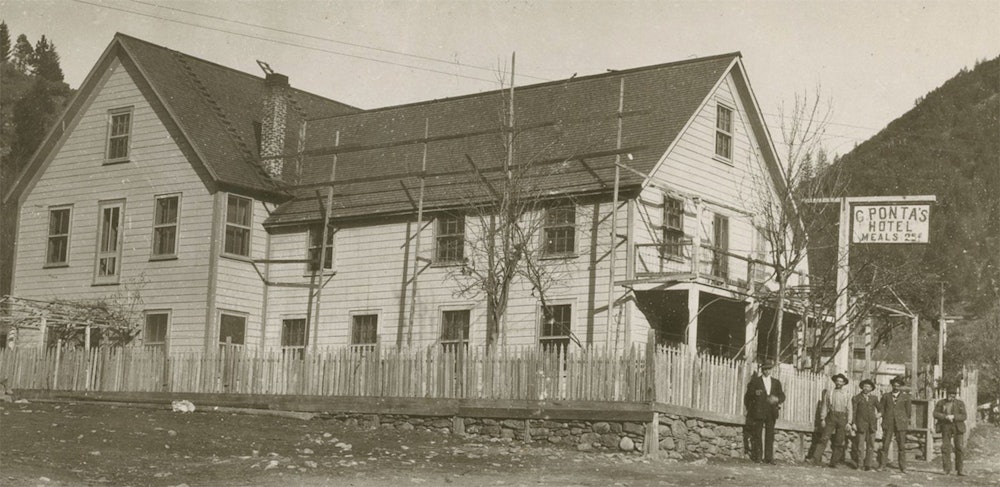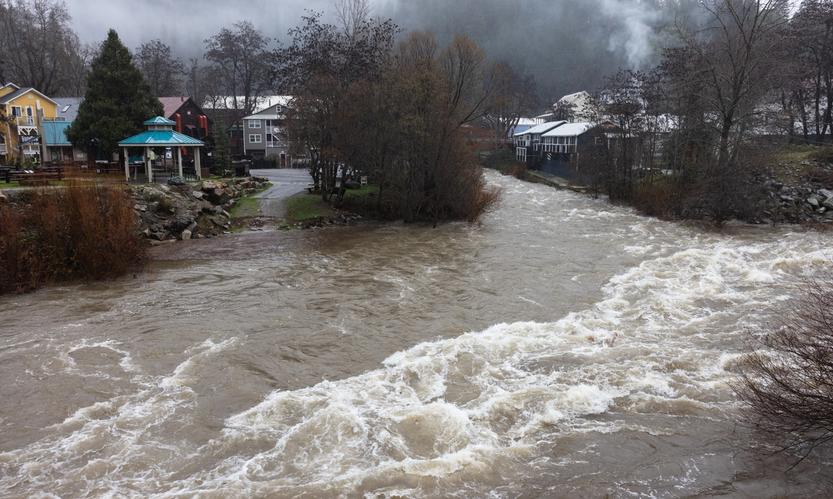Tracing the Footsteps of Our Ancestors — Part 9
December 21, 2023
It is likely that nobody is alive anymore who remembers the building when it operated as a hotel. Still, old-timers may remember the building as the home of the George Bachels family for many years and later the Charles Hardesty family. More recently, the building has been referred to as the “Yuba Expeditions House” up until its most recent private purchase. It should be noted that the part of town where the building is located was once Downieville’s “Chinatown,” which burned down in 1895 and was never rebuilt. In September of 1896, the Mountain Messenger reported Joseph Ponta “had carpenters at work on the erection of his boarding house in the Upper Plaza.” Not long after Joseph Ponta opened the hotel, he had a large addition built to the rear of the building (nearly doubling its size) that was later torn down in the 1930s (refer to Gus Poggi’s comment above as a possible reason for the demolition work). Board and lodging at the hotel in the early 1900s cost $20 per month, or $5 per week, and single meals cost 24 cents. Carolina Bottaro Ponta was well-known in Sierra County for her authentic Italian cooking. Joseph Ponta not only thrived in the hotel and restaurant business but also owned a mine, as well as a ranch on the south side of the North Yuba River opposite the present-day Fiddle Creek Campground near Indian Valley. James J. Sinnott wrote that a “wagon bridge spanned the river at this point during the years Joseph Ponta cultivated a fine piece of land on the south side, an area of ranch land which had earlier been the ranch and home of the Erwin family… The bridge was abandoned when in 1920 the completion of the new State Highway 49 no longer required the use of the early road from Indian Hill to Indian Valley.” Sinnott mentions that Joseph Ponta and his wife “cultivated the ranch, raising vegetables, with a good section of it being in potatoes. They also had several cows, and raised hay.” The Morning Union newspaper of September 26, 1919, reported Ponta’s purchase of the Erwin Ranch, stating, “the property consists of 160 acres of patented land, about 60 acres of which are under cultivation and the balance timer land… The property has been allowed to run down during the past few years, but Mr. Ponta plans many improvements and in a year or two he will undoubtedly have a fine place. He and his wife will continue to reside in Downieville, leaving the ranch in competent hands and going down to superintend the improvements whenever it is necessary.” Of interest, Joseph Ponta and his wife made a visit to their homeland of Italy in 1913. The Sacramento Daily Union of July 21, 1913, reported, “Mr. and Mrs. Giuseppe Ponta, owners of the Butcher ranch mine in the Gold Lake district and who for the past 20 years have conducted the Ponta hotel in Downieville, making it popular throughout the Sierras for its Italian cuisine, leave on Monday for a visit to their native home in Italy. They expect to return at Christmas.” I was able to find Ponta and his wife listed on the crew list of the S.S. France that sailed from Le Havre on October 18, 1913 (the couple’s return trip). The reason listed for the couple’s visit to Italy was so Joseph Ponta could see his father in Arquata Scrivia (the province in which the hometown of the Ponta family, Rigoroso, is located). Joseph Ponta maintained communications with his extended family in Italy, even receiving a letter “from a nephew who has been a prisoner of war in Austria for over two years. The young man was captured by Austrians in one of the first battles following Italy’s declaration of war upon Germany and has been confined ever since,” according to the Morning Union of May 21, 1918. Stay tuned in for next week’s article, which will continue to focus on Sierra County’s immigrants from the Piedmont region of Italy and my travels there. Ponta’s Hotel (Joseph Ponta at center of group)There was a time in Downieville’s history when numerous hotels populated the town’s streets. Many were lost to fire (the Capitol Hotel in 1936 and the St. Charles Hotel in 1947, for example), and others, like the Sierra Hotel, were torn down (if I remember correctly, the late Gus Poggi, a descendent of Italian immigrants, humorously stated this structure was torn down because there were more hotels in town than visitors). One building that still stands in Downieville at 401 Main Street was a structure once known as “Ponta’s Hotel,” which was operated by Giuseppe “Joseph” Ponta (1852-1928) and his wife Carolina Bottaro (1863-1937).
Ponta’s Hotel (Joseph Ponta at center of group)There was a time in Downieville’s history when numerous hotels populated the town’s streets. Many were lost to fire (the Capitol Hotel in 1936 and the St. Charles Hotel in 1947, for example), and others, like the Sierra Hotel, were torn down (if I remember correctly, the late Gus Poggi, a descendent of Italian immigrants, humorously stated this structure was torn down because there were more hotels in town than visitors). One building that still stands in Downieville at 401 Main Street was a structure once known as “Ponta’s Hotel,” which was operated by Giuseppe “Joseph” Ponta (1852-1928) and his wife Carolina Bottaro (1863-1937).
Featured Articles

Storms Bring Heavy Rainfall and Local Disruptions →
December 22, 2025
Sierra County faces power outages and water issues amid heavy rainfall and storm warnings.
215 Animals Seized for Cruelty from Grass Valley Property →
December 22, 2025
Human Remains Found Near South Yuba Bridge in March Identified →
December 17, 2025
Transfer Station Burn Suspended After Community Concerns →
December 16, 2025
Sierra Hardware Plans Extensive Repairs After Flood Damage →
December 8, 2025